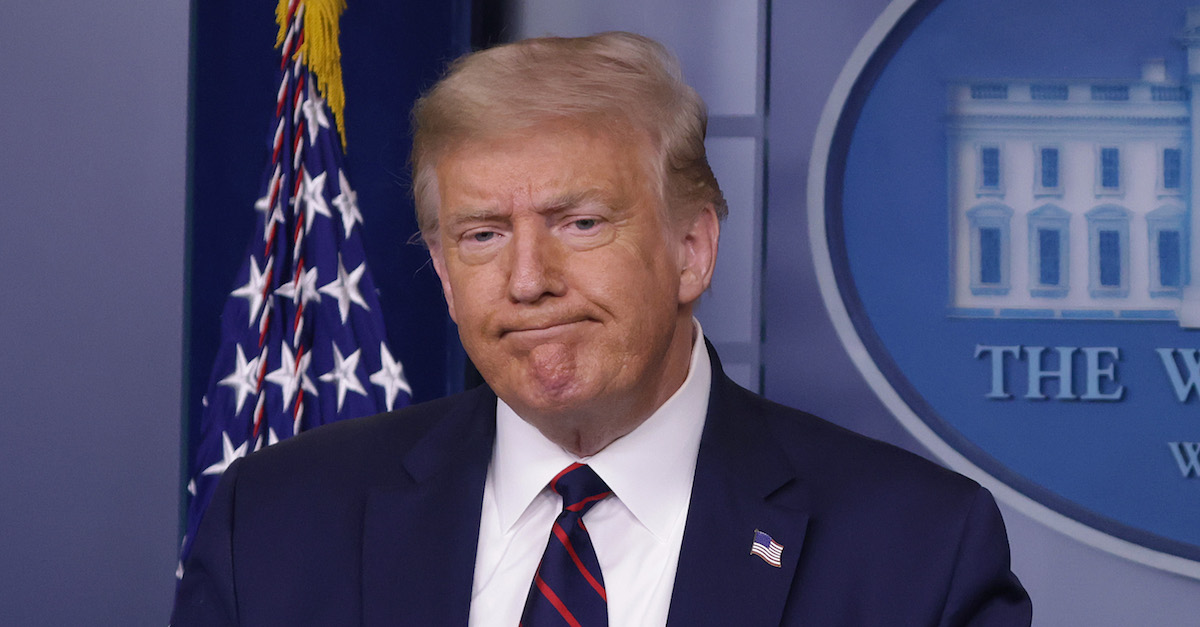
It’s three months prior to a presidential election, we’re still in a pandemic, and our incumbent just suggested that he has the power to stop certain forms of voting from being counted.
When asked by a member of the press about whether he was or wasn’t contemplating an executive order restricting mail-in voting, President Donald Trump responded,“Well, I have the right to do it. We haven’t gotten there yet, but we’ll see what happens.”
Although President Trump seems absolutely convinced that he has the authority to ban mail-in voting via executive order, those familiar with election law know otherwise.
Let’s break it down. First, we’ll discuss executive orders generally.
Executive orders are one type of written instruction that a president can use to act. Other methods of action are available too – like memoranda or proclamations. There are some differences among these different kinds of presidential directives. Most notably, executive orders are usually what are used to direct government officials and agencies (as opposed to private businesses or individuals), and executive orders are usually published in the Federal Register, while other kinds of directives may remain unpublished.
Majestic as executive orders may sound, they only allow a president to exercise power that the president already has. The founders of our nation were sticklers about that. The president only got the powers specifically granted to him by the Constitution, or powers that were delegated to the president via Act of Congress. (Sometimes those are the subject of litigation: congress can’t delegate too much of its authority to the president without breaking the constitution.)
As the chief executive, the president’s function is to enforce laws – not to create them. And giving a law a new name (like “executive order”) doesn’t change the rules.
Things can seem a little confusing when we begin talking about federal administrative agencies. The executive branch is made up of more than just the president. Presidents often use executive orders to direct executive agencies to do or to not do certain things (such as President Barack Obama’s DACA order, which directed DHS to de-prioritize certain immigrants for deportation). When those directives to agencies have great effect on the lives of individuals, they seem a lot like the passage of a law. However, for an executive order to survive judicial scrutiny, it must stay within the scope of a president’s existing authority. That’s why the DACA order was legal (the president already had authority to direct DHS how to allocate its resources), and why Bill Clinton’s order prohibiting federal contractors from replacing striking employees wasn’t (it conflicted with federal labor law).
Bottom line: President Trump cannot legally issue an executive order banning mail-in voting unless he already has authority (either directly from the Constitution or secondarily through an Act of Congress) to ban mail-in voting. And it’s clear that he has no such authority. Here’s why.
The Constitution creates the often-criticized, always-complicated method of the electoral college for electing the nation’s president. Complex as the method is, though, it contains no role for the executive branch in elections.
Individual states make their own laws and create their own systems for allowing citizens to cast votes, and then “presidential electors” ultimately deliver those votes to Congress. Under Article II, §1, cl. 4, the “Elections Clause,” Congress has the authority to choose the time and day on which members of the electoral college cast their votes – but no authority to set up election rules for the states. That’s why elections can look markedly different from state to state.
It’s noteworthy that the Constitution has separate clauses for Congressional elections and for presidential ones. Congress’s power to regulate presidential elections is less than its power to regulate House and Senate elections. Again, though, the Constitution lays out exactly zero power for the executive branch – and there has been no subsequent Act of Congress to change things.
Experts in election law typically agree that Congress has at least some power to protect the integrity of a presidential election by postponing or other methods in the face of a national emergency. That’s Congress, though; not the president.
Some believe that Congress could delegate a portion of its authority regarding elections to the president; however, there is significant disagreement among experts as to what Congress could constitutionally delegate to the executive branch. In the case of President Trump and mail-in voting, this is purely an exercise in hypotheticals. Congress hasn’t delegated to him any power to ban mail-in voting. He has no constitutional authority to override state election laws.
Plus, there’s the Fourteenth Amendment, which guarantees the right to vote to all Americans, thereby limiting even the states’ rights to adopt overly-burdensome election laws. It’s not even entirely clear that individual states could entirely ban mail-in voting – but what’s absolutely certain is that whatever authority the states have, the federal government has less.
So where does this leave us with respect to Trump’s boast about unilaterally banning mail-in voting when he finally gets around to it? If he does issue the executive order he mentioned, everyone from individual voters to state secretaries of state to members of the electoral college would likely have standing to challenge that order in court. Once litigation begins, the outcome wouldn’t be much of a nail-biter: there is no legal basis for Trump president to override state election procedures, and the order would be struck down on that basis.
[Photo by Alex Wong/Getty Images]